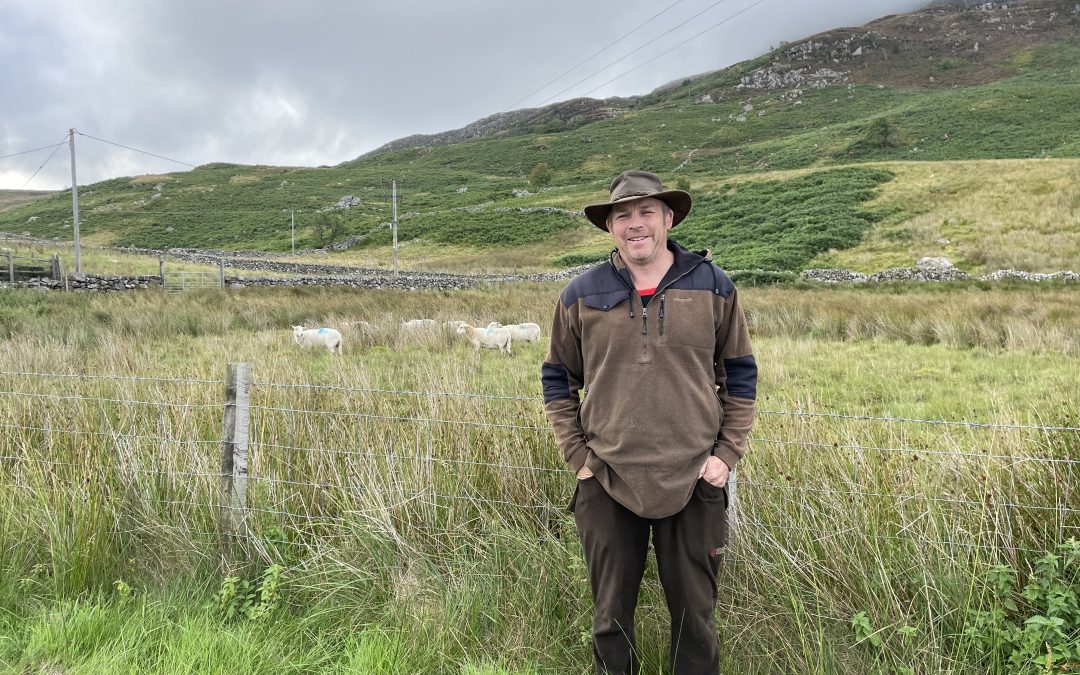Sheep will continue to be the lifeblood of the Welsh mountains. “Is there anything else that can convert poor-quality forage into high-quality protein,” questions Gwynedd farmer, Euros Puw. However, he says efficient native hill genetics will be essential and amongst them, performance recorded Hardy Welsh Mountain rams are already helping to provide a solution.
“We need sheep that are going to be sustainable and resilient,” he explains. “You have to farm what you have and at least cost, and for me our Hardy Welsh Mountain sheep win hands down simply because they do exactly what it says on the tin – they not only survive but also thrive off forage in a harsh environment.”
Euros runs 410 pure Hardy Welsh Mountain ewes at between 1,000’ and 1,700’on his mountain located near Llyn Celyn. “We are about breeding a hardy ewe that can be cheaply kept 365 days of the year on our 200ha of hill and a further 70ha of unimproved ffridd, without any shelter, and absolute minimal inputs yet maximise her lamb potential on an equally poor diet.
“Last season the main flock scanned 138%, it overwintered at over 1,000’, we introduced supplementary fodder beet and energy blocks for four months prior to lambing in April and 85% lambed within the first cycle. We checked them on the ffridd once a day during lambing,” he explains. “The flock is rearing an average of 125% to 128% and averaging five crops. These ewes which mature at an average 40kg remain on the mountain for all their lives apart from the two tooths which we pull off to give them an easier winter.”
The male singles are weaned at 18 to 20 weeks and heaviest sold fat. “They used to weigh an average 26.5kg, however further to my endeavours over the last 30 years, plus the very recent addition of performance recorded rams from HCC’s Hill Ram Scheme, this year they averaged 31.5kg. I hope these rams will help to accelerate further improvement.
“A further 240 Hardy Welsh Mountain ewes not in the best condition or not up to the required criteria put to a Texel ram and wintered at Castell Hen and tack. Finished progeny are sold direct. We aim for 28kg at 15 to 16 weeks, and an average 34kg to 36kg over whole selling season.”
The Puw family arrived to Castell Hen 240 years ago. Euros grandfather, William Puw invested in the mountain in 1952 which has since been stocked with Hardy Welsh Mountain ewes. “Whilst the same genetics persist, I have no interest in colour of fleece or heads, however, we continue to like sheep that have good teeth, depth of body, width on the shoulder and pelvis and a good spring of rib.
“We’ve now added to our selection criteria EBVs for 12-week weight, a figure reflecting the ewe’s ability to convert forage and produce milk. And with the hike in concentrate, feed conversion is vital. Supplementary feed is to be avoided at all cost.”
He continues: “HCC’s Hill Ram Scheme has given me the impetus to monitor the pure Hardy Welsh Mountain flock’s performance and weigh both ram and ewe lambs. Our minimum selection criteria is for a 250gm daily liveweight gain for a month after 16-week weaning.
“I used to select our replacement lambs on looks, whereas nowadays they have to weigh a minimum 20kg at 20 weeks in mid-September. Equally, we weigh the ram lambs retained for breeding purposes and they must reach a minimum 35kg at six months of age,” he says adding: “The scheme has brought focus to help me to breed and rear a more efficient and sustainable Hardy Welsh Mountain flock whilst supplementary feeding is kept to a minimum.”
